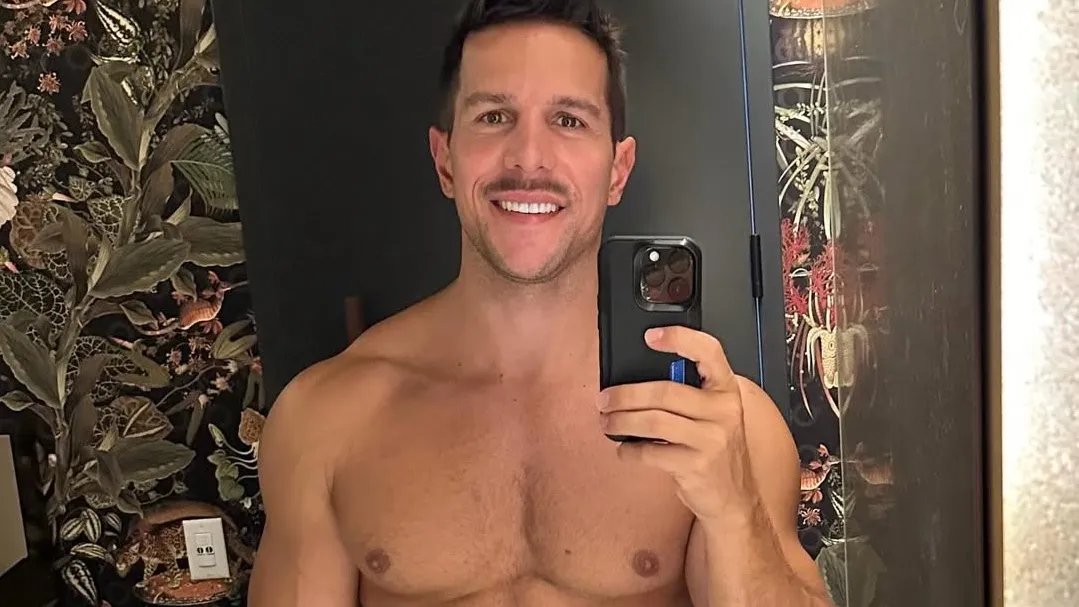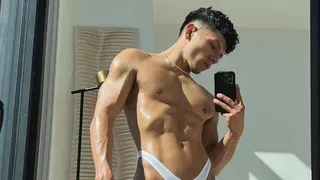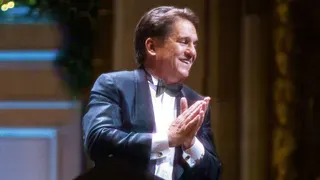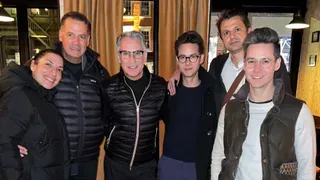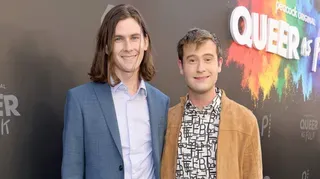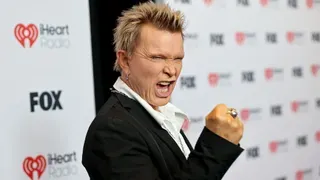November 3, 2023
EDGE Interview: Out Filmmaker Maryam Keshavarz Unlocks Family Secrets in 'The Persian Version'
Steve Duffy READ TIME: 10 MIN.
In her film "The Persian Version," writer/director Maryam Keshavarz looks at her family history to tell the secret reason why her parents emigrated to America in 1967. Though a fiction film, Keshavarz delved into her family's past to learn that her life as an out, bisexual in contemporary America has something in common with her family's exit from Iran.
There is tension between Iranian-American Leila (Layla Mohammadi, acting as Keshavarz's film stand-in) and her mom Shireen (Niousha Noor) over Leila's sexuality, which her mother disapproves of. Complicating matters is that Leila has recently divorced her wife and reveals – during a family crisis that has brought the family together – that she is pregnant after a one-night stand with a "Hedwig and the Angry Inch" lookalike. "Punctuated by a bright color palette, snappy comedic relief, and vibrant dance numbers, 'The Persian Version' delivers an honest portrayal of a woman who remains unapologetically herself, blended seamlessly into a heartfelt story about family, belonging, and the undeniable influence of pop music," writes Cinema Without Borders.
Winning both the Audience Award and the Waldo Salt Screenwriting Award in the U.S. Dramatic Competition at this year's Sundance Film Festival, Keshavarz's film is currently in limited theatrical release.
"Circumstance," her 2011 film about a lesbian relationship in Iran, also won the Audience Award from Sundance. It was also caught up in its own controversy when it was banned from Iran and was that country's top black market DVD that year. And, with the film's success, came Keshavarz being banned from the Islamic Republic for life.
EDGE spoke to Keshavarz about why she wanted to share her family's secret in the form of this comedy/drama, how she didn't want to tell the story, and what it is like to be LGBTQ+ in today's Iran.
EDGE: Tell us about "The Persian Version."
Maryam Keshavarz: The film is about a mother-daughter relationship that's been estranged, and when the daughter returns to her family home her grandmother tells her about a big family secret. This secret propels the story forward between different decades, where the mother and daughter realize they're not as different as they thought.
EDGE: The film begins with "This story is kind of based on a true story." How close is it to your own life?
Maryam Keshavarz: It's very based on my family's story. It's only slightly fictionalized in terms of order, but it is our story. It's the story of my parents coming to America from Iran in 1967. As an immigrant family, we all have these stories of why we came to America. My parents were escaping a big scandal, so the film playfully traces their journey through three different narrators.
EDGE: Why did you want to tell your story?
Maryam Keshavarz: Trust me, I didn't want to. I was pulled into it. I was telling a joke at a party about my family's secrets, and little did I know there was a film producer there. She's like, "Oh my God, that's amazing. So funny. You should make that into a film." After the party, she kept calling me and harassing me. She said it really could be a great film. To get her to stop asking I told her I was going to make it as a comedy. Of course, she thought it was a great idea.
One of the reasons I went into film was to show a more nuanced portrayal of people from Middle Eastern immigrants. Certainly, after 9/11, and then again with Trump's xenophobic rhetoric, I thought it's really time to do something that's authentic about my community and something that could connect us as Americans.
EDGE: Your mom is a boss. What do you find inspiring about her?
Maryam Keshavarz: Honestly, I don't think I would be a director. I work in the most male-dominated and chauvinistic industry in the world, and I was always taught to be a badass and to break the rules. All my films are about women who break the rules and who don't follow the status quo. A lot of my work is based on my experience of watching my mother. She taught me to never be a victim. In her life, she not only takes on challenges but becomes very successful and always stays super positive. There was always a sense of joy at home, and she always had the ability to keep positive in the face of difficult times, which is something I definitely learned from her.
EDGE: The relationship between you, your mom, and grandmother is at the heart of the story...
Maryam Keshavarz: It was important that I allowed each of those narrators to have their own style of storytelling. They each get a moment in the film to shine. My character, Leila, is more like '80s and '90s pop. My grandmother tells big stories and tall tales. She's a spaghetti western. My mother, who's very much psychologically trapped in the past, has never really dealt with the trauma. I wanted to give each of them their own voice. It was important for me that they each of them have a space in the story. I think when I was trying to crack the story, I couldn't really get it because it's such a complicated story, until I realized that my mother came to this country to rewrite her history.
My mother is literally the writer of the story. She must have her own voice. I knew that she had to break the fourth wall and demand her own story as a writer.
EDGE: Tell us about the Iranian LGBTQ+ community and what is like for them in Iran.
Maryam Keshavarz: My first film, "Circumstance," dealt with it. Iran is like any country, where probably 10% of all people are queer. I have a running joke that everyone's gay until they meet the right person. The LGBTQ+ community certainly exists in Iran, but it is hidden. They have their own underground parties and events and community. It's very dangerous for Iranians, particularly for men more than women. There are a lot of precautions taken in terms of who enters those spaces. There should be gay rights in Iran. There's certainly more activism around it. Gay people who want to leave Iran find help via an underground railroad. There is help for them to get to San Francisco, Toronto, and Istanbul. There is help getting them resettled and finding jobs, particularly in San Francisco.
EDGE: Given the storyline of the film, Cyndi Lauper's "Girls Just Want to Have Fun" is the perfect theme song. Why did you choose it?
Maryam Keshavarz: As a kid, that song was so big for me. When the music video came out, it was something I had never seen before. It had all genders, queer people, and people of color. There had never been anything like that. For the time, it was revolutionary. So, as a kid, it was a very big deal. No matter what the environment was back then, even if were struggling in New York in the '80s and '90s, during the crack and the AIDS epidemic, this song just brought me and so many others so much joy. Particularly for women, this song was an anthem. It gave us a sense of joy and showed us no matter what, no one could bring us down.
EDGE: I love the line from the movie: "Remember to live among your ambitions."
Maryam Keshavarz: I think it's such a great philosophical concept. When my family came here from Iran, they were amazed at how much we work here. When you ask someone anything about themselves, they tell you their job. They don't tell you their favorite poem, or which movie they love; it is always about their job. We are so much identified by what we do, and I think that line is also to remember to have a life outside of our work, business, and ambitions. We need to remember to be in the present moment and to appreciate our family. That's a big thing in Iran. Family parties and events that they have together are important parts of our identity alongside our ambitions. One doesn't supersede the other. You have to have a balance.
EDGE: How did your family react to the film, especially your mother?
Maryam Keshavarz: I was totally nervous. I'm not going to lie. Most of my brothers and my mom came to Sundance, and the rest of them watched it remotely from New York. I have a twin brother, the cheerleader in the film. He was happy that the actor who played him was good-looking. I cast really good-looking versions of them. After the screening, we attended an after-party, and I was looking for my mom. While I was talking to my agent and lawyer, my mom, who's a little woman, came up to me, grabbed my face, and said, "You did us justice!" She liked the film. I think it's a big moment even for her to allow me to make the film because, in the past, she'd always said, "We have to save face. We can't talk about these things." It's a big shift in her mentality, and now, obviously, with everything that's happening in Iran. We do have to tell our stories, and we do have to push the boundaries, or things will never change.
EDGE: What's next for you?
Maryam Keshavarz: I am doing another film that's semi-autobiographical that takes place slightly earlier than this film. It's a little crazier than this one. It's sort of a remake of "Rebecca" in some ways. Stay tuned.
"The Persian Version" is in limited release at theaters. For more information, follow this link.
Watch the trailer:
